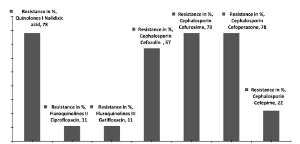Vibrio alginolyticus has been described as a pathogenic species that can cause vibriosis in shrimp and many marine fishes. A total of nine V. alginolyticus isolates were segregated from 25 water samples collected from various locations at Muttukadu brackishwater lagoon in Tamil Nadu, India. The isolates were separated and characterised phenotypically and genotypically and tested for antibiotic resistance against a range of 14 antimicrobial agents. All the isolates were resistant to the penicillin group of antibiotics. The isolates exhibited higher rates of resistance against antibiotics such as chloramphenicol, nalidixic acid, cefuroxime, cefoperazone, and cefazolin and moderately resistant against tetracycline, tobramycin, gentamicin, cefepime, and showed lower degree resistance against doxycycline, ciprofloxacin and gatifloxacin. The MAR index of the isolates (0.285 to 0.5) indicated that they have originated from high-risk sources of contamination. Genome fingerprinting with RAPD and ERIC-PCR showed that RAPD was highly discriminatory than ERIC-PCR for the tested isolates. Further, both fingerprinting analyses revealed a high level of genetic diversity among the isolates. These data unequivocally indicated that the population of V. alginolyticus in a brackishwater environment was not dominated by any environmentally adapted strains and there was mixing and dispersal of genotypes within water samples.
Phenotypic characterisation and strain differentiation of Vibrio alginolyticus isolates from Muttukadu brackishwater lagoon
